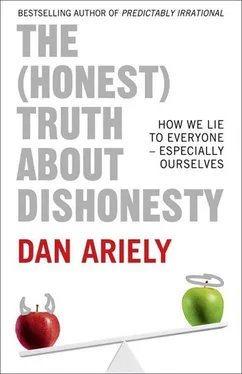Ariely, Dan - The (Honest) Truth About Dishonesty - How We Lie to Everyone – Especially Ourselves
Здесь есть возможность читать онлайн «Ariely, Dan - The (Honest) Truth About Dishonesty - How We Lie to Everyone – Especially Ourselves» весь текст электронной книги совершенно бесплатно (целиком полную версию без сокращений). В некоторых случаях можно слушать аудио, скачать через торрент в формате fb2 и присутствует краткое содержание. Жанр: Старинная литература, на английском языке. Описание произведения, (предисловие) а так же отзывы посетителей доступны на портале библиотеки ЛибКат.
- Название:The (Honest) Truth About Dishonesty: How We Lie to Everyone – Especially Ourselves
- Автор:
- Жанр:
- Год:неизвестен
- ISBN:нет данных
- Рейтинг книги:4 / 5. Голосов: 1
-
Избранное:Добавить в избранное
- Отзывы:
-
Ваша оценка:
- 80
- 1
- 2
- 3
- 4
- 5
The (Honest) Truth About Dishonesty: How We Lie to Everyone – Especially Ourselves: краткое содержание, описание и аннотация
Предлагаем к чтению аннотацию, описание, краткое содержание или предисловие (зависит от того, что написал сам автор книги «The (Honest) Truth About Dishonesty: How We Lie to Everyone – Especially Ourselves»). Если вы не нашли необходимую информацию о книге — напишите в комментариях, мы постараемся отыскать её.
The (Honest) Truth About Dishonesty: How We Lie to Everyone – Especially Ourselves — читать онлайн бесплатно полную книгу (весь текст) целиком
Ниже представлен текст книги, разбитый по страницам. Система сохранения места последней прочитанной страницы, позволяет с удобством читать онлайн бесплатно книгу «The (Honest) Truth About Dishonesty: How We Lie to Everyone – Especially Ourselves», без необходимости каждый раз заново искать на чём Вы остановились. Поставьте закладку, и сможете в любой момент перейти на страницу, на которой закончили чтение.
Интервал:
Закладка:
In addition to exploring the forces that shape dishonesty, one of the main practical benefits of the behavioral economics approach is that it shows us the internal and environmental influences on our behavior. Once we more clearly understand the forces that really drive us, we discover that we are not helpless in the face of our human follies (dishonesty included), that we can restructure our environment, and that by doing so we can achieve better behaviors and outcomes.
It’s my hope that the research I describe in the following chapters will help us understand what causes our own dishonest behavior and point to some interesting ways to curb and limit it.
And now for the journey …
CHAPTER 1
Testing the Simple Model of Rational Crime (SMORC)
Let me come right out and say it. They cheat. You cheat. And yes, I also cheat from time to time.
As a college professor, I try to mix things up a bit in order to keep my students interested in the material. To this end, I occasionally invite interesting guest speakers to class, which is also a nice way to reduce the time I spend on preparation. Basically, it’s a win-win-win situation for the guest speaker, the class, and, of course, me.
For one of these “get out of teaching free” lectures, I invited a special guest to my behavioral economics class. This clever, well-established man has a fine pedigree: before becoming a legendary business consultant to prominent banks and CEOs, he had earned his juris doctor and, before that, a bachelor’s at Princeton. “Over the past few years,” I told the class, “our distinguished guest has been helping business elites achieve their dreams!”
With that introduction, the guest took the stage. He was forthright from the get-go. “Today I am going to help you reach your dreams. Your dreams of MONEY!” he shouted with a thumping, Zumba-trainer voice. “Do you guys want to make some MONEY?”
Everyone nodded and laughed, appreciating his enthusiastic, non-buttoned-down approach.
“Is anybody here rich?” he asked. “I know I am, but you college students aren’t. No, you are all poor. But that’s going to change through the power of CHEATING! Let’s do it!”
He then recited the names of some infamous cheaters, from Genghis Khan through the present, including a dozen CEOs, Alex Rodriguez, Bernie Madoff, Martha Stewart, and more. “You all want to be like them,” he exhorted. “You want to have power and money! And all that can be yours through cheating. Pay attention, and I will give you the secret!”
With that inspiring introduction, it was now time for a group exercise. He asked the students to close their eyes and take three deep, cleansing breaths. “Imagine you have cheated and gotten your first ten million dollars,” he said. “What will you do with this money? You! In the turquoise shirt!”
“A house,” said the student bashfully.
“A HOUSE? We rich people call that a MANSION. You?” he said, pointing to another student.
“A vacation.”
“To the private island you own? Perfect! When you make the kind of money that great cheaters make, it changes your life. Is anyone here a foodie?”
A few students raised their hands.
“What about a meal made personally by Jacques Pépin? A wine tasting at Châteauneuf-du-Pape? When you make enough money, you can live large forever. Just ask Donald Trump! Look, we all know that for ten million dollars you would drive over your boyfriend or girlfriend. I am here to tell you that it is okay and to release the handbrake for you!”
By that time most of the students were starting to realize that they were not dealing with a serious role model. But having spent the last ten minutes sharing dreams about all the exciting things they would do with their first $10 million, they were torn between the desire to be rich and the recognition that cheating is morally wrong.
“I can sense your hesitation,” the lecturer said. “You must not let your emotions dictate your actions. You must confront your fears through a cost-benefit analysis. What are the pros of getting rich by cheating?” he asked.
“You get rich!” the students responded.
“That’s right. And what are the cons?”
“You get caught!”
“Ah,” said the lecturer, “There is a CHANCE you will get caught. BUT—here is the secret! Getting caught cheating is not the same as getting punished for cheating. Look at Bernie Ebbers, the ex-CEO of WorldCom. His lawyer whipped out the ‘Aw, shucks’ defense, saying that Ebbers simply did not know what was going on. Or Jeff Skilling, former CEO of Enron, who famously wrote an e-mail saying, ‘Shred the documents, they’re onto us.’ Skilling later testified that he was just being ‘sarcastic’! Now, if these defenses don’t work, you can always skip town to a country with no extradition laws!”
Slowly but surely, my guest lecturer—who in real life is a stand-up comedian named Jeff Kreisler and the author of a satirical book called Get Rich Cheating —was making a hard case for approaching financial decisions on a purely cost-benefit basis and paying no attention to moral considerations. Listening to Jeff’s lecture, the students realized that from a perfectly rational perspective, he was absolutely right. But at the same time they could not help but feel disturbed and repulsed by his endorsement of cheating as the best path to success.
At the end of the class, I asked the students to think about the extent to which their own behavior fit with the SMORC. “How many opportunities to cheat without getting caught do you have in a regular day?” I asked them. “How many of these opportunities do you take? How much more cheating would we see around us if everyone took Jeff’s cost-benefit approach?”
Setting Up the Testing Stage
Both Becker’s and Jeff’s approach to dishonesty are comprised of three basic elements: (1) the benefit that one stands to gain from the crime; (2) the probability of getting caught; and (3) the expected punishment if one is caught. By comparing the first component (the gain) with the last two components (the costs), the rational human being can determine whether committing a particular crime is worth it or not.
Now, it could be that the SMORC is an accurate description of the way people make decisions about honesty and cheating, but the uneasiness experienced by my students (and myself) with the implications of the SMORC suggests that it’s worth digging a bit further to figure out what is really going on. (The next few pages will describe in some detail the way we will measure cheating throughout this book, so please pay attention.)
My colleagues Nina Mazar (a professor at the University of Toronto) and On Amir (a professor at the University of California at San Diego) and I decided to take a closer look at how people cheat. We posted announcements all over the MIT campus (where I was a professor at the time), offering students a chance to earn up to $10 for about ten minutes of their time. *At the appointed time, participants entered a room where they sat in chairs with small desks attached (the typical exam-style setup). Next, each participant received a sheet of paper containing a series of twenty different matrices (structured like the example you see on the next page) and were told that their task was to find in each of these matrices two numbers that added up to 10 (we call this the matrix task, and we will refer to it throughout much of this book). We also told them that they had five minutes to solve as many of the twenty matrices as possible and that they would get paid 50 cents per correct answer (an amount that varied depending on the experiment). Once the experimenter said, “Begin!” the participants turned the page over and started solving these simple math problems as quickly as they could.
Читать дальшеИнтервал:
Закладка:
Похожие книги на «The (Honest) Truth About Dishonesty: How We Lie to Everyone – Especially Ourselves»
Представляем Вашему вниманию похожие книги на «The (Honest) Truth About Dishonesty: How We Lie to Everyone – Especially Ourselves» списком для выбора. Мы отобрали схожую по названию и смыслу литературу в надежде предоставить читателям больше вариантов отыскать новые, интересные, ещё непрочитанные произведения.
Обсуждение, отзывы о книге «The (Honest) Truth About Dishonesty: How We Lie to Everyone – Especially Ourselves» и просто собственные мнения читателей. Оставьте ваши комментарии, напишите, что Вы думаете о произведении, его смысле или главных героях. Укажите что конкретно понравилось, а что нет, и почему Вы так считаете.












